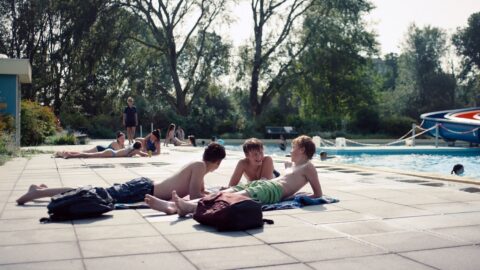In the current deeply unserious American discourse, the word “groomer” has been so aggressively politicised that it’s now a throwaway insult, hurled daily on (deadname alert) Twitter by both the right and the left.
On the right, it’s used to smear LGBTQ+ people, teachers or anyone working with kids as part of a sweeping moral panic; on the left, it’s sometimes flipped to brand conservative figures or institutions as predatory. In both cases, the term stops being a description of a specific, manipulative pattern of behaviour and becomes a blunt rhetorical weapon. This misuse doesn’t just cheapen the word — it actively harms real victims, whose experiences risk being trivialised or misunderstood. When “groomer” becomes shorthand for “someone I politically dislike,” we lose the ability to talk clearly about actual abuse, recognise warning signs or support the people who’ve endured it.
It’s refreshing, then, to see a Dutch filmmaker take the word seriously. Karin Junger’s difficult new film The Pupil (2025), based on Steven van der Hoeven’s autobiographical book Je Ogen Verraden Je, examines what grooming actually looks like by showing how a teenage football player is slowly pulled into a predatory relationship with his coach. Playing in the International Youth Competition Programme, the film is realistic and sensitive, and never lurid or exploitive, even if a few scenes come close to the limits of what you’d want a child actor to navigate.
Twelve-year-old Daan (Bart de Wilde) is a normal kid with normal concerns: friends, football, a girl he likes. He does well in school and has a supportive family. Coach Dries (Gijs Naber) begins giving him extra attention — inviting him over after practice, giving him a seemingly safe space to play video games and hang out with a guy who shares the same interest in sports. These moments are so ordinary (for Daan), they almost dissolve into the background, which is exactly the point: danger blends into daily life long before it becomes recognisable.
Dries establishes trust in increments before moving forward. From there, he starts pushing boundaries, showing Daan pornography, testing what he can normalise, inching closer to physical violation. It’s extremely uncomfortable to watch, but Junger handles it with care and precision that avoids sensationalism. Unlike last year’s No Dogs Allowed (Steve Bache, 2024) (a well-intentioned yet flawed film about a teenage pedophile that was convinced that audiences need to actually see a grown man and a teenager in a sexual act), Junger knows exactly how far she needs to go — where to place the camera, and how to cut away. She trusts the audience to fill in the gaps.
It’s a well-crafted film, shot like your normal mid-budget European production, and the performances carry a lot of the film’s weight. Newcomer de Wilde is excellent as Daan, capturing both the tentative self-confidence of a 12-year-old and the vulnerability that makes him susceptible to an adult’s attention. His shift from “happy, regular kid” to isolated, confused, angry and acting out is nuanced and believable. Gijs Naber plays Dries with unnerving charm: not a typical movie monster, but the kind of man real families trust without a second thought, the guy you’d let drive your kid to a football match because he seems so kind, harmless and helpful. That surface harmlessness is exactly what makes him scary — the casual manipulation he puts the child through even more so.
All forms of grooming are horrifying, but what The Pupil depicts is the most chilling kind: abuse that hides inside everyday trust. One early scene captures this with distinct clarity. Dries and Daan clean the showers together just meters from Daan’s father on the field. Dries takes off his shirt, sprays Daan with the hose, gets him to take his off too. For Daan, it’s harmless horseplay; for Dries, it’s calculated, punctuated by the quick glance he sneaks right in front of the boy’s dad. It’s grooming in broad daylight.
(Mild spoiler alert.) When the abusive situation finally comes to light, the parents’ reaction becomes one of the film’s most painful threads. They’re horrified and desperate to help, but their panic slips into unintentional victim-blaming — multiple “Why didn’t you tell us?” questions born from guilt and disbelief. The film neither condemns nor absolves them. It simply shows how loving, functional families can falter under trauma they never imagined, and how parents should not only be better at detecting warning signs, but also communicating about abuse after the fact.
This isn’t an easy or enjoyable film to watch, but it’s already being used in a practical way. Victim Support Netherlands and The Film Kitchen are holding “impact screenings” with discussions attached, helping communities recognise red flags earlier and support victims more effectively. With sexual misconduct in sports still rampant, tools like this are crucial for parents, kids, coaches and clubs.
The horror of The Pupil lies in its plausibility, and the audience knowing this happens every day. By stripping away the online noise and showing grooming as the slow, hard-to-detect process it is, the film shatters the comforting myth that predators are easy to spot. They don’t just lurk in shadows or hide in vans — they sit at your kitchen table, smiling, eating homemade apple pie, convinced no one will ever suspect them.
Earl Peterson lives in Baltimore, Maryland
